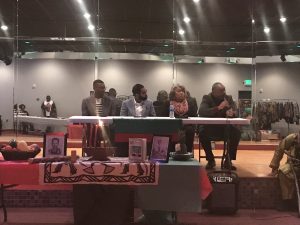By Erica Wright
The Birmingham Times

The room in the Club M Event Center in west Birmingham was filled Thursday with the spirit of unity as area residents celebrated the first day of Kwanzaa, beginning a week-long annual celebration to honor African heritage in African American culture.
It is observed from December 26 to January 1.
The Birmingham Kwanzaa Committee celebrated Umoja, meaning unity, the first of seven Kwanzaa principles, during a festive gathering that included vendors, live drums and dance, and a panel discussion featuring area leaders and law enforcement to discuss ways to unify the black community.
Clarence Muhammad, co-chair of the Birmingham Kwanzaa Committee, said the cultural holiday is celebrated by black and African people all over the world.
“It deals with African culture from a pan-African perspective,” he said. “Kwanzaa comes from the Swahili language and we use words dealing with the Swahili perspective . . . it’s for everybody whether you are black Christian, Buddhist, Muslim or atheist… it is not a replacement for Christmas.”
The committee will celebrate Kwanzaa for the next week, with an event every day based on one of the seven principles of Kwanzaa: in addition to Umoja they are Kujichagulia, self-determination; Ujima, collective work and responsibility; Ujamaa, cooperative economics; Nia, purpose; Kuumba, creativity; and Imani, which is faith.
During Thursday night’s event panelists included Jefferson County Sheriff Mark Pettway; Jefferson County Circuit Court Judge

Tamara Harris-Johnson; real estate investor and community leader Gilberto Herrera; and Lawson State Community College student, Caleb Neverson.
Pettway talked about initiatives the Sheriff’s Office has in place including the Renewed for Reentry program, which helps ex-offenders and is designed to reduce the recidivism rate by providing education and job opportunities for individuals in the Jefferson County Jail.
“We want to make sure that when they come to our facility, they are not just there sitting all day, every day but have an opportunity to get an education, get skills training and at the end of the program, we give them a job and stipend to leave our facilities with,” said Pettway.
Johnson said the principles of Kwanzaa are needed now more than ever, beginning with unity.
“We don’t have a village anymore,” she said. “We are in a crisis situation. When I was growing up in my village, we did not hurt our children. We hurt our children now. People who look like us hurt our children. That is not acceptable. I look on the TV and see three and five-year-olds being trafficked and killed… we did not do that then, but we do it now.”
Johnson continued, “We’re better than that and we need to be better. We need to get a grasp of our children because they need us, some of them maybe lost but they need us. We need to reincorporate that village. We need to bring them back in… I believe that everybody needs to have somebody, something, some being that they will feel accountable to for their actions.”
The Kwanzaa name comes from the Swahili phrase “matunda ya kwanza,” which means “first fruits.”
Created in 1966 by Maulana Karenga, a professor of Pan-African studies at California State University at Long Beach, Kwanzaa is defined by Nguzo Saba, or the seven principles. Each day of the festival is dedicated to a specific principle, marked by lighting a new candle on the kinara, a seven-branched candelabra.
The second day of Kwanzaa celebration, Kujichagulia, will be at the Crescent Cultural Center, 1121 Tuscaloosa Avenue, 35211 on Friday, Dec. 27 at 6 p.m.
For more information and a list of Kwanzaa celebration events, contact Clarence Muhammad at 205-356-6417.





